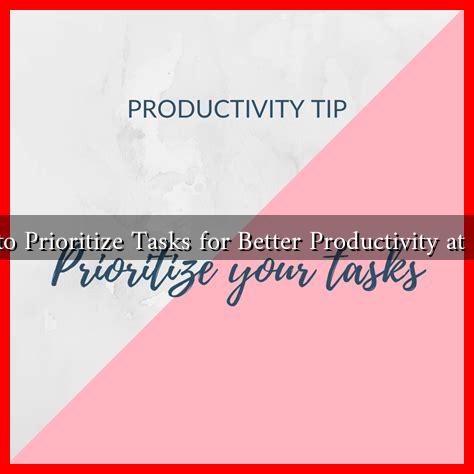-
Table of Contents
How to Prioritize Tasks for Better Productivity at Home
In today’s fast-paced world, managing time effectively is crucial, especially when working from home. With distractions lurking around every corner, it can be challenging to stay focused and productive. Prioritizing tasks is a vital skill that can help you navigate your daily responsibilities more efficiently. This article will explore effective strategies for prioritizing tasks to enhance productivity at home.
The Importance of Task Prioritization
Prioritizing tasks is not just about making a to-do list; it’s about understanding what needs to be done first and why. According to a study by the American Psychological Association, individuals who prioritize their tasks are 25% more productive than those who do not. This is because prioritization helps in:
- Reducing stress by providing clarity on what needs to be accomplished.
- Enhancing focus by allowing you to concentrate on high-impact tasks.
- Improving time management skills, leading to better work-life balance.
Strategies for Effective Task Prioritization
Here are some proven strategies to help you prioritize tasks effectively:
1. The Eisenhower Matrix
The Eisenhower Matrix, developed by former U.S. President Dwight D. Eisenhower, is a powerful tool for prioritizing tasks based on urgency and importance. The matrix divides tasks into four quadrants:
- Quadrant 1: Urgent and Important (Do these tasks immediately)
- Quadrant 2: Important but Not Urgent (Schedule these tasks)
- Quadrant 3: Urgent but Not Important (Delegate these tasks)
- Quadrant 4: Not Urgent and Not Important (Eliminate these tasks)
By categorizing tasks in this manner, you can focus on what truly matters and avoid getting bogged down by less critical activities.
2. The ABCDE Method
Another effective method is the ABCDE prioritization technique, which involves labeling tasks as follows:
- A: Must do – serious consequences if not completed.
- B: Should do – mild consequences if not completed.
- C: Nice to do – no consequences if not completed.
- D: Delegate – tasks that can be assigned to others.
- E: Eliminate – tasks that are unnecessary.
This method helps you to focus on high-priority tasks while delegating or eliminating less important ones.
3. Time Blocking
Time blocking is a technique where you allocate specific blocks of time to different tasks or activities. This method not only helps in prioritizing tasks but also in managing time effectively. For example:
- 8:00 AM – 9:00 AM: Respond to emails
- 9:00 AM – 11:00 AM: Work on project A
- 11:00 AM – 12:00 PM: Team meeting
- 1:00 PM – 3:00 PM: Focus on project B
By dedicating time slots to specific tasks, you can minimize distractions and maintain a steady workflow.
Case Study: The Impact of Prioritization on Productivity
A study conducted by the productivity app Todoist found that users who regularly prioritize their tasks report a 30% increase in productivity. One user, Sarah, a freelance graphic designer, implemented the Eisenhower Matrix in her daily routine. By categorizing her tasks, she was able to focus on client projects that had tight deadlines while scheduling less urgent tasks for later in the week. As a result, she not only met her deadlines but also found time to explore new design techniques, enhancing her skills.
Conclusion
Prioritizing tasks is essential for improving productivity at home. By utilizing methods such as the Eisenhower Matrix, the ABCDE method, and time blocking, you can effectively manage your workload and reduce stress. Remember, the key to successful prioritization lies in understanding the importance and urgency of each task. By implementing these strategies, you can create a more organized and productive home environment.
For more insights on productivity and time management, consider visiting Mind Tools.

